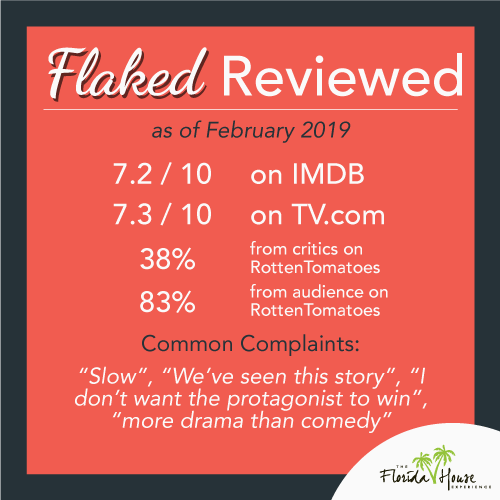
Flaked, about an alcoholic man in Venice Beach, California, follows Chip and a group his friends and acquaintances as they attempt to navigate very real problems in what has become a very idealized community.
The character Chip, written, directed and acted by Will Arnett of Arrested Development fame, has a complicated background marked by deception, and certain events occur in the first season that shows the audience that he (and several other characters) may not be who they seem.
We’ll try as hard as possible not to spoil important parts of the show, which now has two seasons on Netflix. It’s an interesting story, made more intriguing by the fact that the writer and director wrote many of the experiences its characters have with addiction from his own point of view.
One of the main themes of the show is that Chip and several of his closest allies struggle with alcoholism, and many of the show’s scenes occur in and around 12-step meetings. In this piece, we discuss how this conflict affects the reality of the show, despite several high-profile critiques that it’s not relatable.
Arnett Speaks Out
 There has been some criticism of the show, on one hand, some viewers claim it doesn’t deliver the jokes or straight drama that you might expect. To this Arnett has explained that he wanted it to portray these characters realistically. People aren’t constantly witty and quick with a great one-liner in real life, after all. Arnett has responded to these reactions as well. This isn’t the usual case of a writer being upset because critics don’t like his show. Arnett’s defense is that the purpose and goal of the show is misunderstood. Arnett took offense to a Hollywood Reporter interview he gave, after which the Reporter posted an article criticizing Flaked as “unrealistic.”
There has been some criticism of the show, on one hand, some viewers claim it doesn’t deliver the jokes or straight drama that you might expect. To this Arnett has explained that he wanted it to portray these characters realistically. People aren’t constantly witty and quick with a great one-liner in real life, after all. Arnett has responded to these reactions as well. This isn’t the usual case of a writer being upset because critics don’t like his show. Arnett’s defense is that the purpose and goal of the show is misunderstood. Arnett took offense to a Hollywood Reporter interview he gave, after which the Reporter posted an article criticizing Flaked as “unrealistic.”
The actor claimed that while many people may not be able to relate to this idyllic, often privileged life in sunny Venice Beach, where adult men ride around on bicycles and date much younger women, these are incidents that he and people that he based the show around really experience in their daily life.
His offense at criticisms suggests there is more to this than just an actor and writer being upset because critics didn’t like his show, and Arnett is the first to admit that there’s something deeply personal for him about Flaked.
Struggles With Addiction
Alcoholism is a disease that affects millions of people. According to NCADD, one in 12 adults will struggle with alcoholism in their lifetime, and according to what we know to be true about addiction, the vast majority of those struggles will be lifelong.
Will Arnett has been very open about his past interactions with addiction and the reasons why he was completely sober as early as the first few seasons of the hit comedy Arrested Development, on which Arnett co-starred.
He also opened up to the Hollywood Reporter about his personal struggles during the filming of season one of Flaked. According to the actor, some of his writing dug up raw issues in his past. The timing of the show also coincided with a rough divorce with former-SNL writer/cast member and star of Parks and Recreation Amy Poehler after nearly a decade of marriage.
The combination of these factors, according to Arnett, led to relapse and near-reset of his entire recovery.
How Flaked Reflects Arnett’s Real-Life Struggles
 Flaked, as a total product, doesn’t stand up to the critiques of many who have watched it. It’s a flawed narrative that seems to twist in one moment and stagnate in another. In a vacuum, it’s an intriguing story and not much more.
Flaked, as a total product, doesn’t stand up to the critiques of many who have watched it. It’s a flawed narrative that seems to twist in one moment and stagnate in another. In a vacuum, it’s an intriguing story and not much more.
The complexities of Flaked come to the surface when viewed through a lens of addiction. The most impressive part of what Arnett does in his series is to paint a picture of himself that is both biographical and completely unrealistic.
Arnett is an addict in real life, but Chip is deeply flawed in ways that fall outside of the lines of his disease. Remember, you can be flawed in spite of addiction, but addiction is not itself a moral failing.
He’s a narcissist, and potentially, a sociopath. But when looked at from the perspective of someone who deals with addiction on a daily basis, the show becomes an extremely realistic depiction of the struggles a person can face trying to stay sober in a world of temptation. Here’s how Arnett’s writing in Flaked can help us understand real-life experiences with alcoholism.
12-Step Groups Aren’t a Cure-All
Chip’s experience with the realities of his recovery in and outside of AA meetings paint a vivid picture of 12-step meetings, and it’s the reason why so many people say “it works if you work it.” When Chip stops participating in the 12 steps for his own benefit, they become an empty attempt to maintain sobriety.
This is why it’s unsurprising that the bottle of “Kombucha” Chip is drinking through most of the season is often filled with wine.
The Shame Is Very Real
The fact that Chip is living as one person and feeling like another is a vivid depiction of the dualities that many addicts face. Even Chip’s lies are to cover up past events in his life. His addiction caused those events, and trying to maintain the image of functionality while constantly trying to hold himself together is a reality that addicts and alcoholics face on a daily basis.
When Flaked slows down, there are scenes of reflection, where Chip feels ashamed of his actions and the hard work he has to do to prop up his lies to maintain what little respect his peers have of him.
The Importance of Lifelong Support
One point the show emphasizes is that, despite the fact the main character seems to trivialize his recovery, a support system is necessary to sustain sobriety for a lifetime.
Whether you’re in residential treatment for addiction or using a supportive community to sustain your recovery, it’s important that you never try to do it alone. If you or a loved one are struggling with alcoholism or other addiction, contact FHE Health today and learn how to get help.






